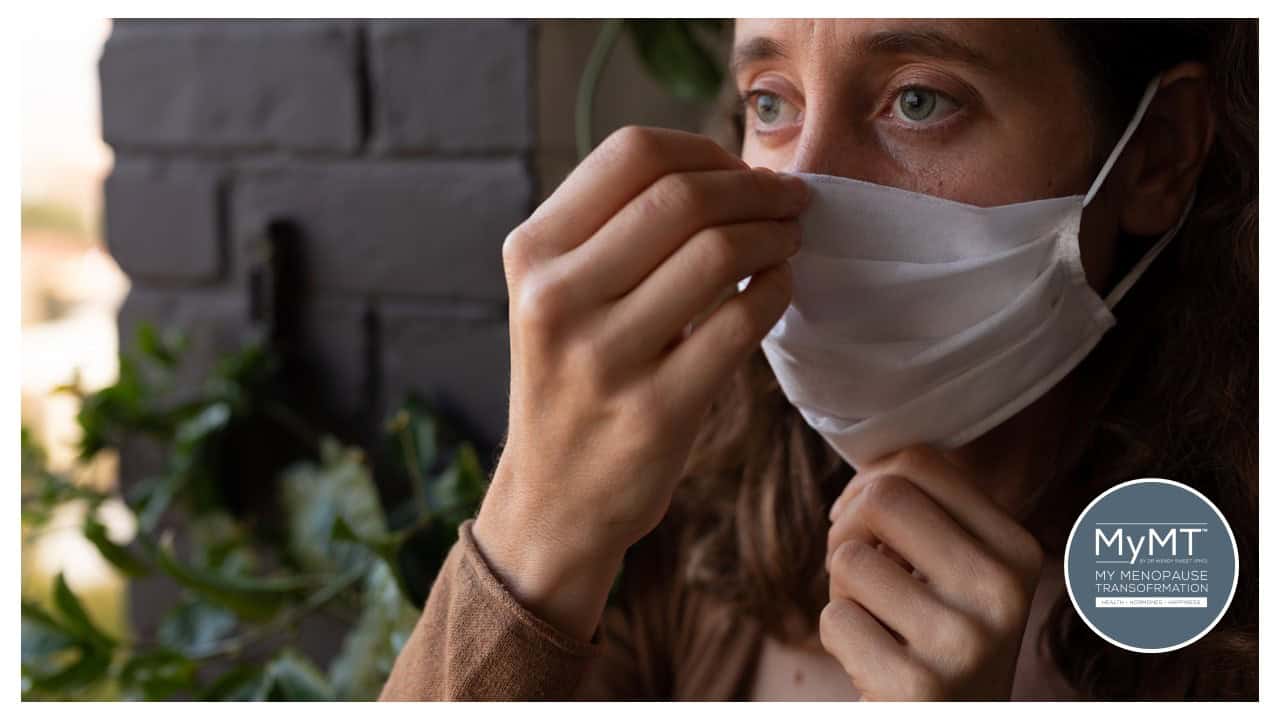“Good morning from the UK. Sorry to hear some of you are in Lockdown in Australia and New Zealand, but I can assure you it’s worth it. I’m in day 10 from contracting the virus and it’s really unpleasant. I’m thankful I’ve been double jabbed. I didn’t really suffer with hot flushes but I am at the moment, wow.” [Helen, UK]
This week New Zealand has extended it’s lockdown. Numerous states in Australia have done the same. It was Delta that somehow crossed the ditch across the Tasman and burst into the community. Hence, I was intrigued with Helen’s note in my coaching group today. Here she was having had her vaccinations and when the virus caught up with her, it hit her with a return of hot flushes, poor sleep and feeling achey in her muscles. Menopause symptoms. And just when she had got on top of all these symptoms with the MyMT™ programme. I’m just pleased though that she has the information to go back and ‘start again’ with her health changes. She was climbing the ladder to feeling better in menopause, but the virus knocked back down again.
But not everyone has this experience. Other women on my programme are the opposite. Their hot flushes went away when they had their vaccination. I haven’t quite figured that one out yet, but perhaps they are in a different age and stage of menopause – remember, that in peri-menopause you are still producing oestrogen and progesterone. Helen is in post-menopause.
That’s why this week, I’m reminding you that we have to up our game, when it comes to our immune health and prevention and I’m thankful to the emerging research which points us in the right direction with looking after ourselves at a time in our lives, when our lung and immune health is changing with menopause and why, we just need to have a bit of a re-focus on anti-viral functional foods and the exercise that is now evidenced to help boost our immunity.
Viral infections have been around for hundreds of years or longer. But we all know that this one is more than ‘just’ a case of seasonal influenza and whether you have had the vaccine or choose not to, there are now certain lifestyle approaches that could play an essential antiviral long-term preventative role according to new research that arrived in my in-box recently. The foods that matter are called functional foods and new research indicates that there are foods specific to coronavirus protection and recovery.
” The antiviral role of nutrition and exercise as the two lifestyle prevention pillars has received little resarch attention” mentions Alkhatib. I’m pleased that he and his team decided to do something about it. “Optimal intake of selected micronutrients has been highlighted in controlling the impact of virulent strain infections, including upper and lower respiratiry tract infections, through optimizing a well-functioning immune system.” (Alkhatib, A. 2020, p. 2)
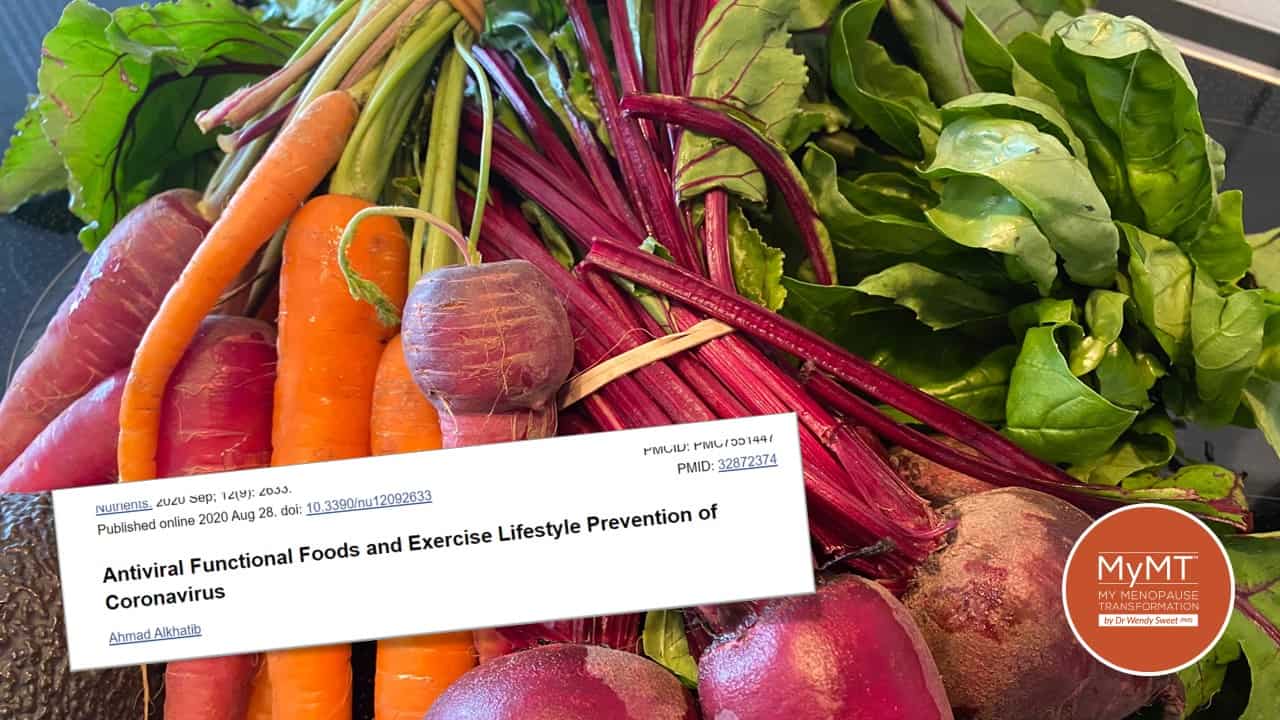
Functional foods offer us a new way to strengthen our immunity. I’ve written about the effect of menopause changes on our lung health HERE and why this time of our life makes us more vulnerable to infections. I’ve also written about our immune health and exercise and why finding theh right balance with the amount, type and intensity of our exercise is also important.
It is well known in sport and exercise science that severe exercise intensity, whether acute or chronic, can be counter-productive in terms of the susceptibility to infections, since it is linked with upper respiratory tract infections (URTI). But just as harmful to our immune health, is the cost of doing no exercise at all. That’s why I encouraged Helen to start by getting outside and walking around the block … 2-3 times a day if she can. I don’t want her to push herself at the moment whilst she is recovering.
Higher exercise intensities (above 70% VO2 max) induce a transient oxidative stress or inflammatory stress and muscle damage. During our menopause transition, our muscles are ageing and changing. This includes the decline of our Type 2 fibres, which are known as our ‘power-fibres’. If you are feeling weaker than normal, then this is why. And whilst some weight training is important to counteract this decline, some of you recovering from the virus, might find that your muscles become sore and you can hardly lift your dinner plate, let alone a barbell.
Finding ways to increase our strength is an important part of our immune health, but so too is progressing slowly when you have had the virus. Many women in my group have found that they feel good initially but then go out and do too much exercise too soon, hence, falling off the ladder again with their progress.
Listening to your body is important, as is understanding that our immune function response to exercise is influenced by several factors including nutritional status, body weight, hygiene and mental health.
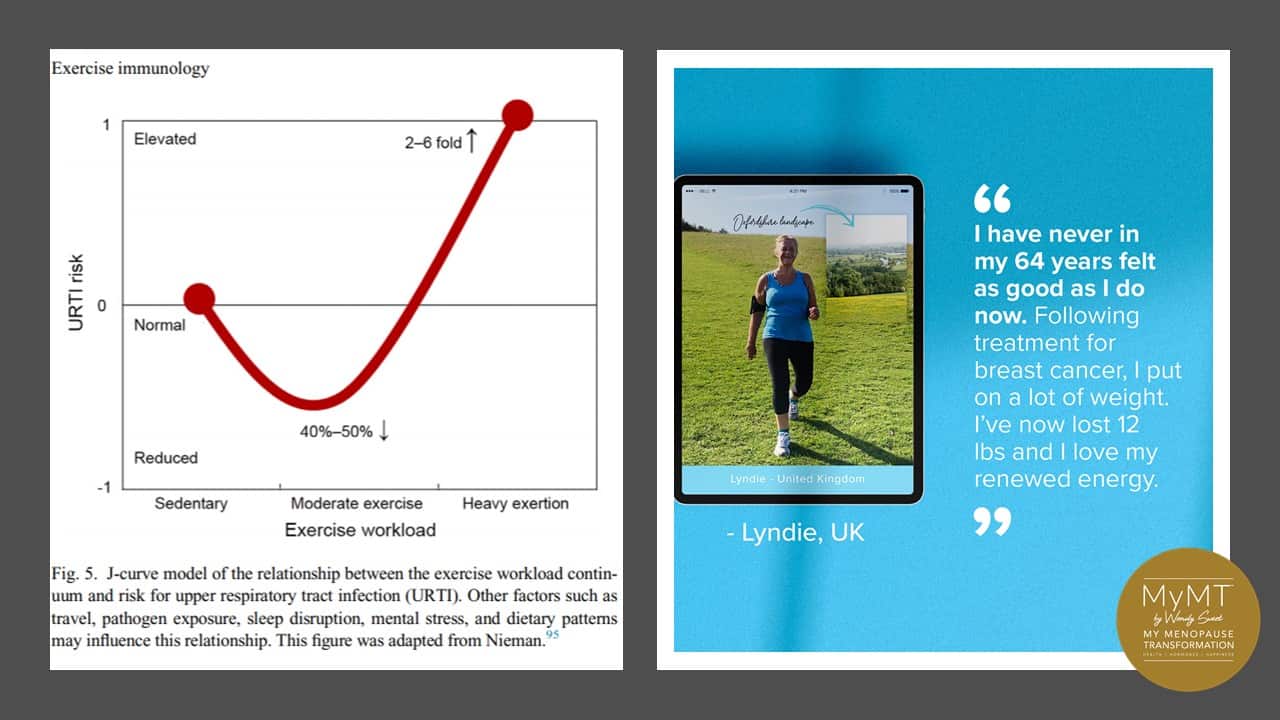
The latest research from Alkhatib (2020) suggests that there is also an optimal level of exercise specifically to prevent the current coronavirus. This research supports my own readings on ‘how much is enough’ and in reference to intensity levels, then ‘moderate’ is best. The most practical way of finding your ‘moderate’ is just to use the calculation 220 (bpm) minus your age. This is a rough estimate of your maximal heart rate for exericse, and then you want to moderate your intensity within 40-70% of this number.
During lockdown situations, this new research, specific to viral protection is helpful, because it shows that you should achieve a minimum of 150 minutes of cardio a week to start with, but then try to build this up to 200-400 minutes of aerobic exercise weekly, distributed across 5-7 days. This means you can try to extend your cardiovascular exercise from 30 minutes, 3 times a week to around 60+ minutes, 5-7 days a week. If your joints don’t allow you to walk for this long, then you could try cycling, swimming (if you aren’t in lockdown) and also explore doing my restoration module, called ‘Restore your Joyful Joints‘ (which is also included in all of my 12 week programmes).
I teach you how to do this in the Rebuild My Fitness programme as well. This is a general range for mid-life women to achieve with their aerobic exercise.
You also want to perform some resistance-type activities. If you are in lockdown and exercising at home, then this could also include lifting and carrying exercises, lunges, stair-climbing, stand-to-sit and sit-to-stand exercises, squats and some yoga-type stretching for strengthening. Again, these workouts are in the 12 week Rebuild My Fitness programme which is an online programme designed for women to get back into healthy exercise again. This is Australian nurse, Lydia, out and about on her bike, before New South Wales turned into chaos.
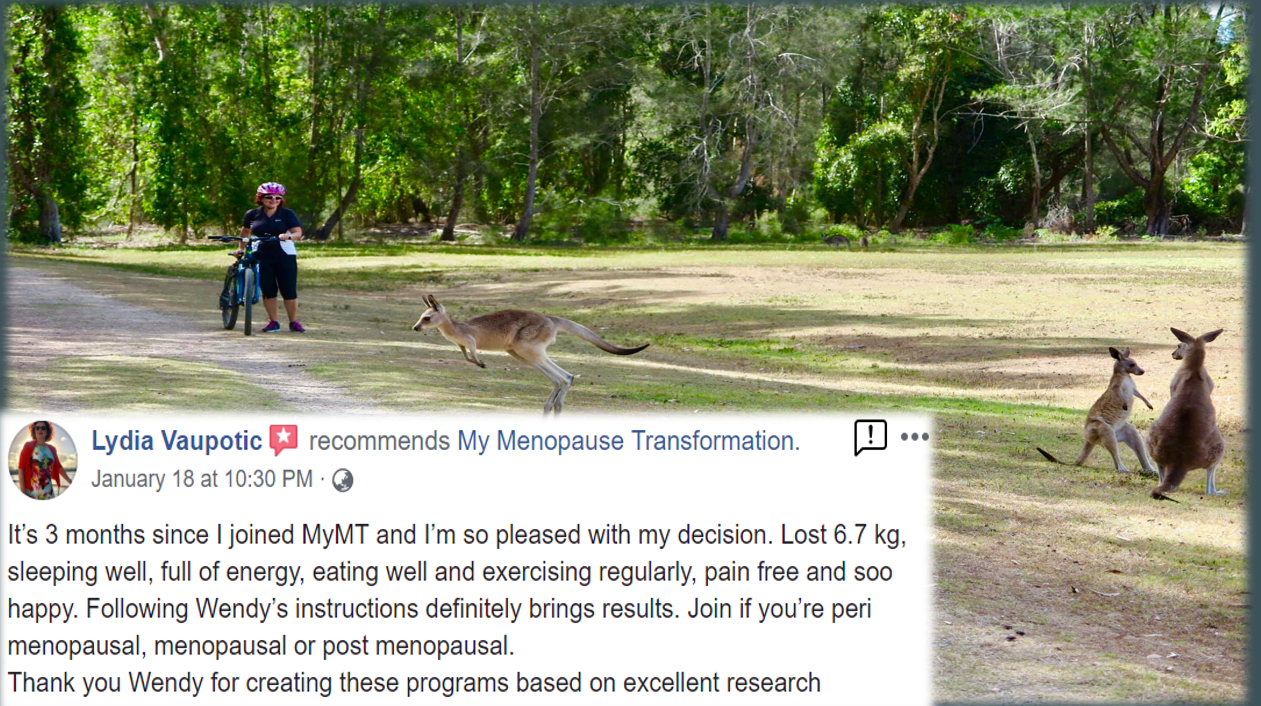
Functional Foods Increase your Antiviral Defence
Not all foods are allowed to be labelled ‘functional’. They can only be called this if they naturally possess active ingredients or ‘nutraceuticals’ and I’m not referring to supplements. Functional foods are real foods that are associated with disease preventative health benefits, especially those diseases characterised by inflammatory and oxidative stress disorders, such as diabetes and cardiovascular disease. Lead author, Ahmed Alkhatib from the Teeside University’s School of Health and Life Sciences division, has explored functional food benefits specific to viral covid infections such as the one currently roaming the world.
Viral infections are characterised by a compromised immune function and deficient micronutrient stores, particularly vitamins. According to Alkhatib’s (2020) research, this includes Vitamin A, B6, B12, C, D, E, folate, selenium, zinc, iron, magnesium and copper.
Evidence already supports that our immune system requires essential fatty acids, essential amino acids, linoleic acids and of course adequate water intake. For women in menopause, this water intake is often forgotten, but I suggest up to 2L a day, to assist in joint health and hot flush management too. Here I am yesterday, getting the beautiful mineral-rich spring water from the local spring, which fortunately, still has access during lockdown. And yes, that photo was taken on a very cold winter morning around 7.30am, hence, wearing my puffer-jacket.
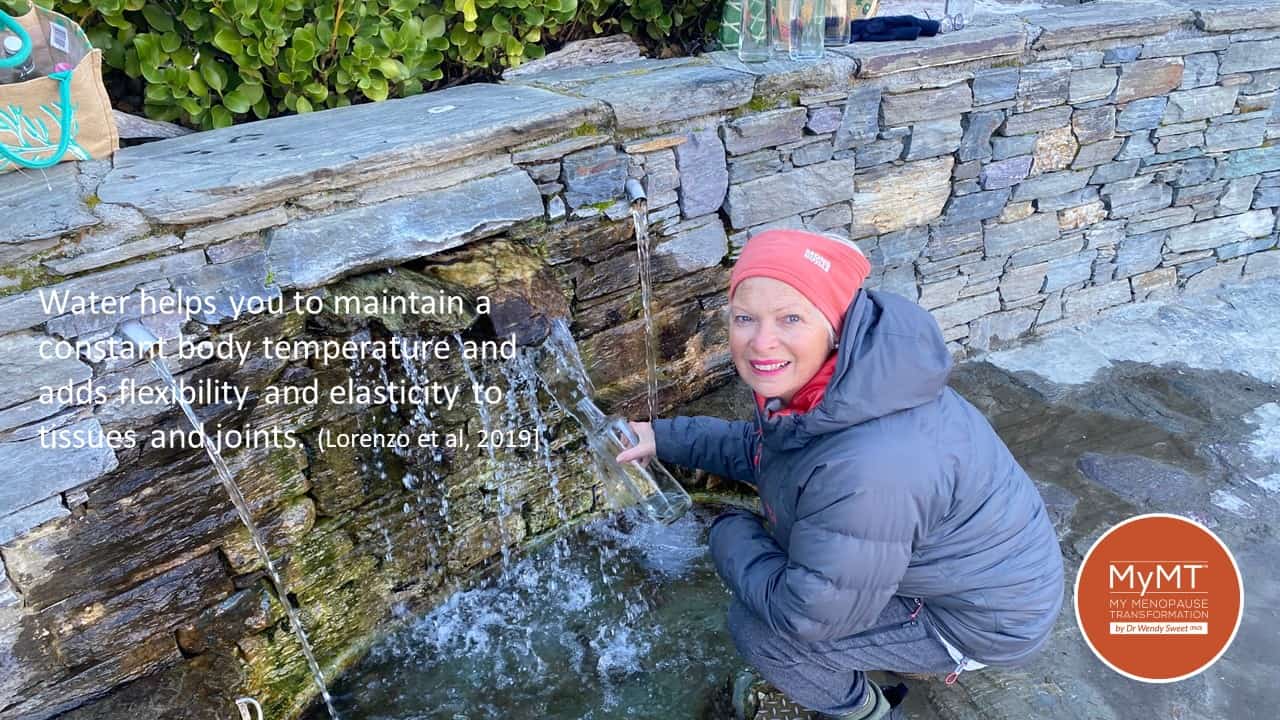
Foods that Matter in Menopause for our Immune Health
Here they are – the functional foods that are specifically listed for helping to prevent or reduce the impact of the current coronavirus. These are just some of the foods that I promote in the MyMT™ porgrammes, but it’s good to know that new research supports including them in our daily diet.
- Fruits and vegetables, including squash, pumpkin and zucchini, legumes, peas and tomatoes, sweet potatoes, potatoes and red peppers. All these vegetables contain plant cyclotides which are well studied anti-virals. They offer a protective function for our immune system. Seasonal vegetable intake also plays a protective role in enhancing our immune system.
- Olive oil and olive leaf extract. Emerging research from the south of Italy is fascinating and indicates that protection from the virus was higher in the south as the intake of olive oil and it’s constituents was higher than in the Northern parts of Italy. I have an emphasis on olive oil in the MyMT™ programmes, because zthe oleuropein in it has been well evidenced for helping our immune health as well as joint health.
- Walnuts, almonds and other nuts and seeds
- Coffee. Epidemiological evidence suggests that consuming 2-3 cups of coffee (not the milk) is associated with reduced incidence of metabolic diseases, such as Diabetes. Caffeic acid in caffeine has antiviral benefits.
- Dairy products. Dairy products contain Vitamin D and it is well accepted that Vitamin D reduces acute respiratory tract infection and it’s deficiency is linked to viral infections. The challenge with dairy products however, is that in menopause, they may increase hot flushes becuase of the natural sugars, so my approach is to keep them to a minimum if possible.
- Fermented foods. Research on the gut-microbiome is increasing at a great rate and my programmes include a GUT HEALTH module too. During menopause our gut lining thins and we become more susceptible to IBS and a host of other gut-related problems, and this impacts our absorption of Vitamin D, B12 and other nutrients. I talk about fermented foods in the programme module, so I’m pleased to see them in the anti-viral functional food research too. (Alkhatib, 2020).
- Peptide and Amino Acids. Promising evidence has been shown about the restorative and anti-oxidant role of traditional medicinal herbs such as Chinese ginseng in immune health. However, like all reaserch we have to be cautious of it, when it has only been undertaken on males, which the Chinese ginseng research has, so don’t read too much into the marketing of it as a female going through menopause. However, fort hose of you who are vegan or vegetarian (which I do support on this programme) you might want to supplement with additional amino acids unless you are adding fish, salmon and lamb (less acidic than beef), to your diet. The research shows that for anti-viral protection, these foods are also sources of immuno-enhancing peptides and amino acids (proteins) that help to improve respiratory and cold symptoms in older persons.
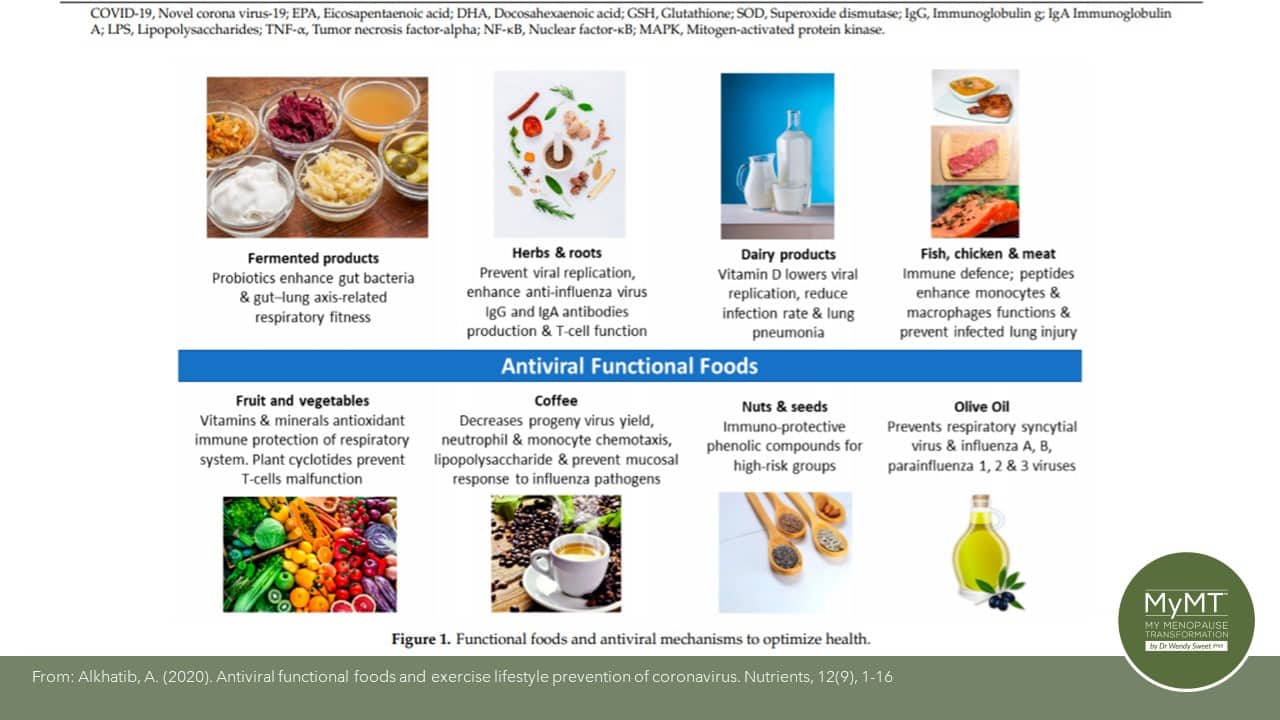
Functional foods and the right type and amount of exercise enhance our immune system and reduce our susceptibility to infections, especially respiratory infections. Whilst many of us in the Southern Hemisphere are in and out of lockdowns, it’s comforting to know that we can find lifestyle strategies that help to strengthen our immune health, when menopause itself, can weaken us, let alone any exposure to the virus.
I also know that it’s hard to have a focus on our own needs, when you have others to consider in your household when it comes to food choices. But what you have to remember is that if you aren’t sleeping and experiencing hot flushes, night sweats or you have gut health problems or are feeling depressed, then giving your immune health a boost is crucial. So, too is turning around your symptoms and understanding the lifestyle solutions that matter in mid-life. When you have time, have a listen to the Masterclass on Menopause, which is my 2 hour webinar (you can ‘pause’ me anytime), and/or join me on either of my 12 week coaching programmes. To find out more about how these work, then please listen to my video HERE.
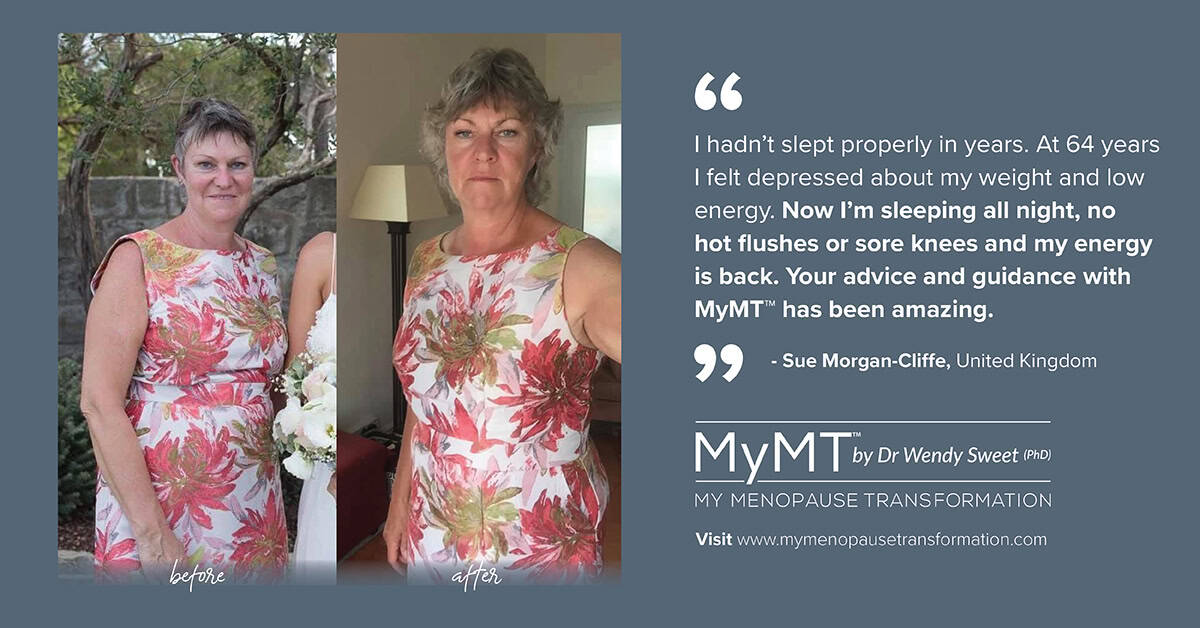
References:
Alkhatib A. (2020). Antiviral Functional Foods and Exercise Lifestyle Prevention of Coronavirus. Nutrients, 12(9), 2633. https://doi.org/10.3390/nu12092633
Lorenzo I, Serra-Prat M, Yébenes JC. (2019). The Role of Water Homeostasis in Muscle Function and Frailty: A Review. Nutrients. 2019; 11(8):1857. https://doi.org/10.3390/nu11081857
